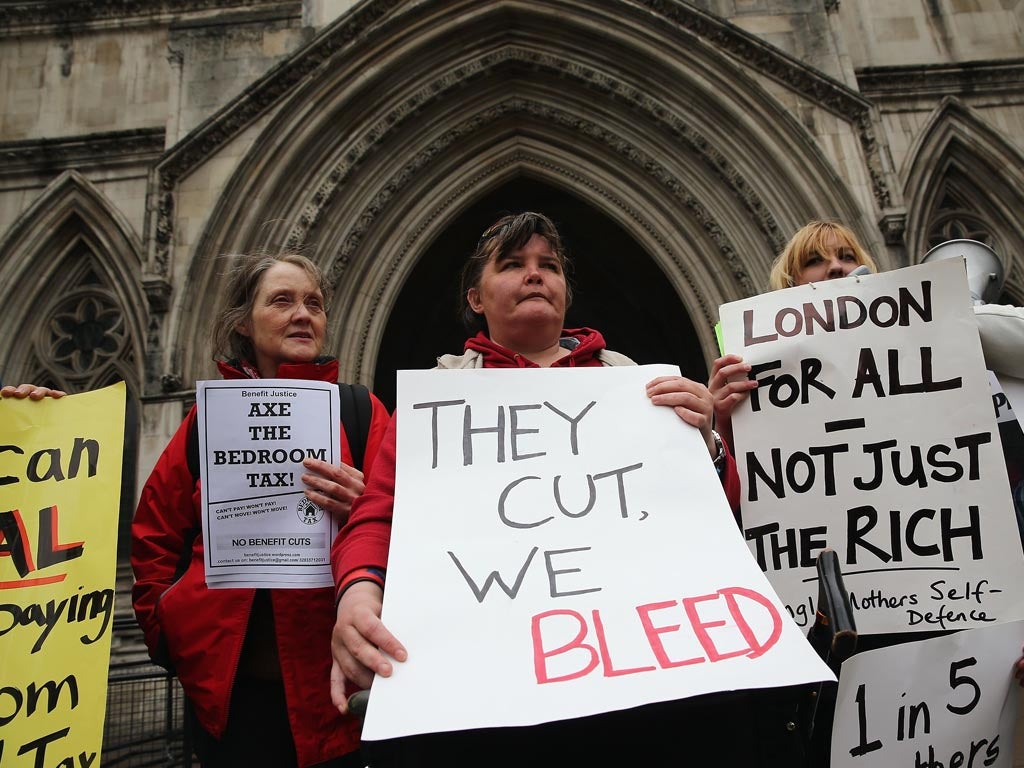Reducing the deficit: Labour growth VS Tory cuts
The poor who spend all their money by necessity and help the local economy, are being hit hardest to pay for the bankers’ folly


Your support helps us to tell the story
From reproductive rights to climate change to Big Tech, The Independent is on the ground when the story is developing. Whether it's investigating the financials of Elon Musk's pro-Trump PAC or producing our latest documentary, 'The A Word', which shines a light on the American women fighting for reproductive rights, we know how important it is to parse out the facts from the messaging.
At such a critical moment in US history, we need reporters on the ground. Your donation allows us to keep sending journalists to speak to both sides of the story.
The Independent is trusted by Americans across the entire political spectrum. And unlike many other quality news outlets, we choose not to lock Americans out of our reporting and analysis with paywalls. We believe quality journalism should be available to everyone, paid for by those who can afford it.
Your support makes all the difference.Despite the pain of eye-watering cuts and division over Europe, the Tories are still keeping their heads above water and the outcome of the next election is in the balance. The public will decide who to vote for based upon which party they think will deliver a stronger economy to pay for a fairer Britain. At the moment, the jury is out.
“Labour messed up the economy and the Tories are making it worse so why should I vote for either?” one voter asked me. “And now that Labour says it won’t reverse the cuts and will spend the same as the Tories, what’s the point of Labour?” another demanded.
Labour’s challenge is to provide a compelling cased as to why Britain would be better off with Labour.
Firstly, the problem is that the electorate don’t yet see a clear choice between the parties - such as more growth and less cuts with Labour to get down the deficit versus more cuts and less growth with the Tories.
Secondly, the Tory marketing machine has been relentless in asserting that Labour messed up the economy in the first place. Labour spent too much, we are told and, given the chance, would do the same again. This is the weed Labour must uproot from public consciousness to win decisively.
Some say it’s too late to set the record straight, so it’s better to talk about the Tories' failures. But not rebutting the charge that Labour messed up makes us look like a shamefaced schoolboy admitting responsibility by omission. And if we don’t rebut the accusation, it will simply amplify to a deafening noise as the election approaches. Most importantly, it simply isn’t true and we should say so. The fact is that last time Labour came to power in 1997 they also inherited an economic mess and Tory spending plans. Then Labour grew the economy by 40 per cent in 10 years, invested more in public services and reduced the debt.
True, the deficit went up once the sub-prime tsunami hit our shores but it was Gordon Brown's and Barack Obama’s fiscal stimulus that ensured a mild recession in 2008/09 instead of a depression. It was Labour’s economic pump priming that meant GDP was growing again by 2010.
So Labour did deliver consistent economic growth between 1998 and 2008 and took the decisive action necessary to save the banks from their own recklessness. Nobody seems to mention this.
Only a third of the 2010 deficit was due to Labour investing above earnings to keep the economy moving forward, with two thirds caused by the bankers. In a downturn, that is the correct economic strategy. To cut in a downturn makes things worse but that is exactly what the Coalition did.
In his 2010 Budget, George Osborne announced half a million job cuts in the public sector, which ensured public sector workers started saving instead of spending in case they lost their jobs. The economy has been at a standstill ever since. The switch from growth to cuts to reduce the deficit has been an unmitigated disaster that will mean the debt to GDP ratio will grow from 55 per cent in 2010 to 85 per cent by 2015.
So the real choice should be between Labour growth and Tory cuts to get down the deficit: Labour’s proud record of growth versus the Tories’ record of cuts without growth.
The Tories are cutting deepest in the North and Wales – where there are more public servants - and spending most in London and the South East – where there are more Tory voters.
One Nation Britain cannot mean 90 per cent of infrastructure spending is in London and the South East. Even the £52bn High Speed 2 rail line would start in the South. Meanwhile, the poor who spend all their money by necessity and help the local economy, are being hit hardest to pay for the bankers’ folly.
The public is crying out for Labour to defend the party's values and achievements and to present a positive vision of Britain succeeding in the world. So Labour needs to set out a vision of a stronger Britain that provides the economic confidence to invest and consume to stimulate jobs and growth. The choice for 2015 needs to be between a future that works and cares – One Nation Labour – and a future that doesn’t works and doesn’t care – Divided Conservative Britain.
The Conservatives have been busy trying to recreate the political choices of the 80s – between an "all heart and no mind" Labour which would tax and spend Britain into bankruptcy versus the hard-nosed business sense of the Tories making tough choices in the nation’s interests.
But how would things be different with Labour? What does a future that works to pay for a future that cares look like?
Labour needs to talk the talk of UK plc - boosting the UK’s productive capacity by linking industry, universities and councils.
We need a sharper focus on the growing export opportunities to the emerging middle classes in China, India, Brazil and Russia for entertainment, cultural and designer demand. We must invest in homes and transport, not spend on failure, and use public procurement as an engine to grow small and medium-sized firms.
The European elections next year are an opportunity to put growth and jobs centre stage. The central question is the cost to trade, investment and jobs of spending four years arguing about whether to walk away from Europe. So far the debate has been dominated by panic-stricken Conservatives creating uncertainty by parroting Ukip - more interested in saving their own jobs than the country’s. Inward investors from growing economies want access into the world’s biggest market – Europe – and not to pay a 14 per cent tariff to export from a detached island. New export opportunities, like the proposed free trade agreement between the US and Europe, are with Europe not Britain and we need to continue a journey towards jobs and growth not be diverted into a cul de sac of still more cuts.
Labour needs to make Britain an innovative leader within a changing Europe whether the issue is corporate tax avoidance, internet child pornography or environmental solidarity. It’s not enough to take a false political temperature based on whether people want a referendum. The response before an informed debate will always be yes.
Labour wasn’t born yesterday. It has a proud history of investing in the welfare state, the NHS, social housing, comprehensive schools and public transport all paid from the blood, sweat and tears of working people. Our historic commitment to a strong economy delivered sustained GDP growth during the last Labour Government up to the international crisis in 2008 and good judgement during it. We should proudly present our record and boldly express our vision of a strong, united country confident of its future in a changing world...a future of hope in place of fear.
Geraint Davies is Labour MP for Swansea West
Join our commenting forum
Join thought-provoking conversations, follow other Independent readers and see their replies
Comments